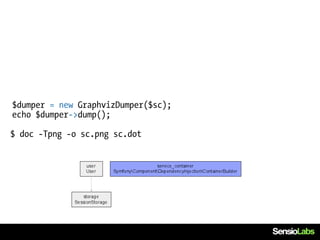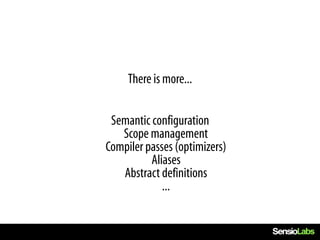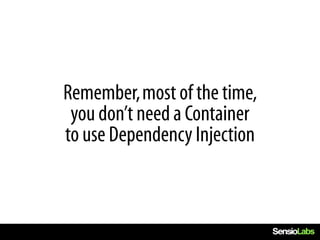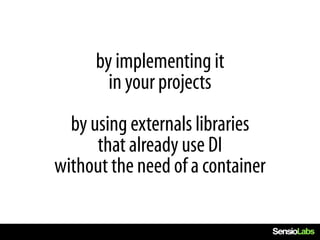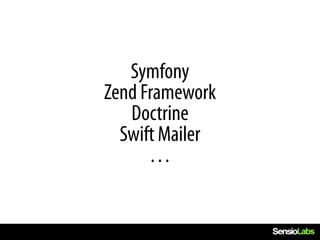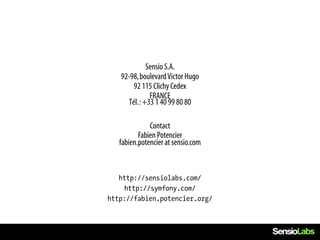The document discusses dependency injection in PHP. It begins with a real-world web application example to demonstrate dependency injection, showing how the User class depends on a SessionStorage class. It then explains how using constructor injection for the dependency rather than hardcoding it makes the code more customizable, configurable, and testable. Dependency injection decouples classes and makes them more reusable and replaceable. The document advocates using a dependency injection container to manage object instantiation and dependencies.
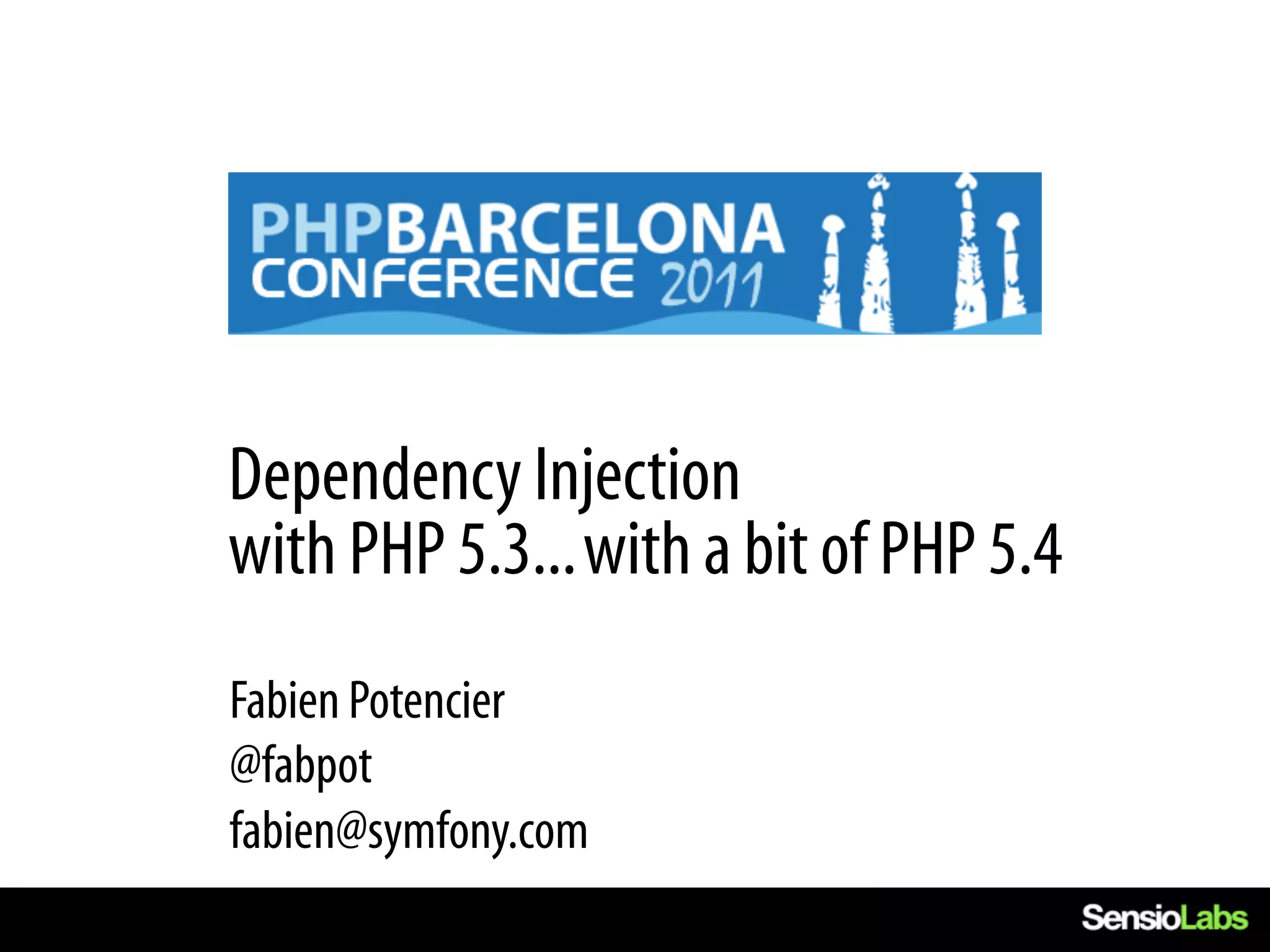
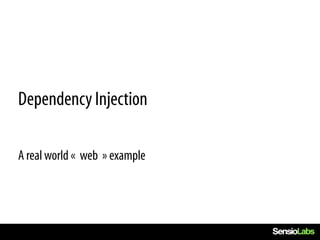
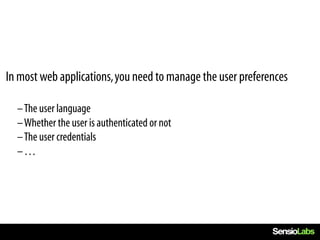
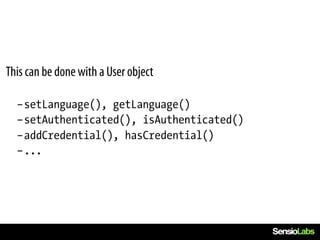
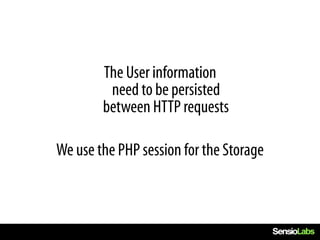
![class SessionStorage
{
function __construct($cookieName = 'PHP_SESS_ID')
{
session_name($cookieName);
session_start();
}
function set($key, $value)
{
$_SESSION[$key] = $value;
}
// ...
}](https://image.slidesharecdn.com/dependency-injection-111028101440-phpapp01/85/Dependency-injection-in-PHP-5-3-5-4-6-320.jpg)
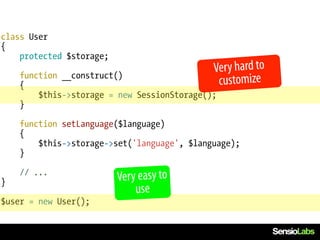
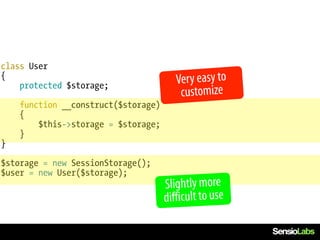
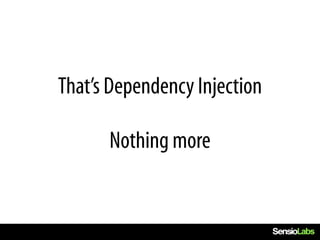
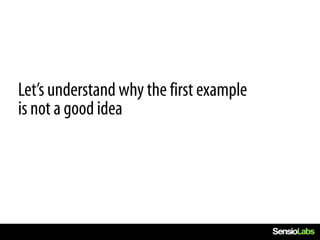
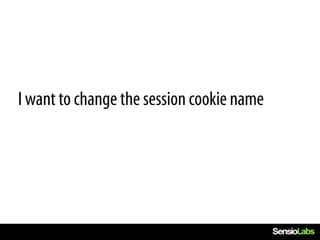
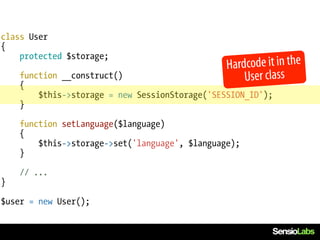
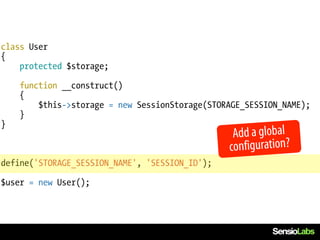
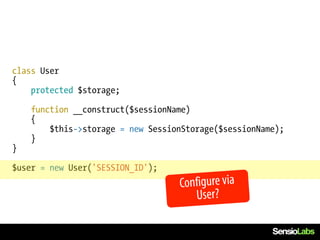
![class User
{
protected $storage;
function __construct($storageOptions)
{
$this->storage = new
SessionStorage($storageOptions['session_name']);
}
}
$user = new User(
array('session_name' => 'SESSION_ID')
);
Configure with an
array?](https://image.slidesharecdn.com/dependency-injection-111028101440-phpapp01/85/Dependency-injection-in-PHP-5-3-5-4-15-320.jpg)
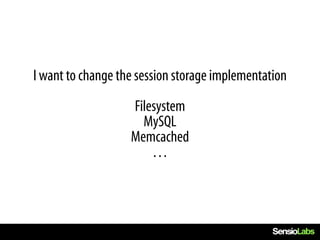
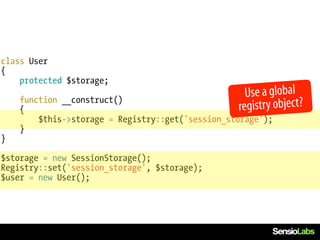

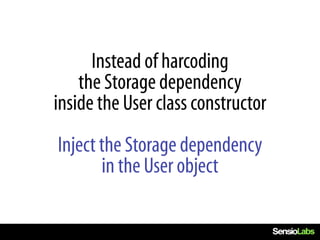
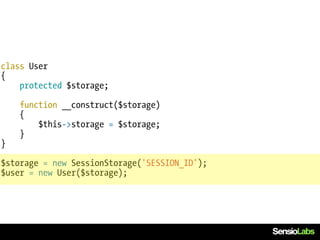

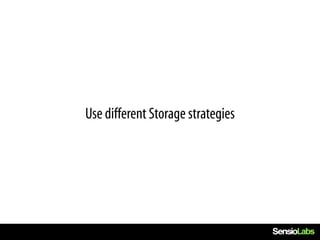
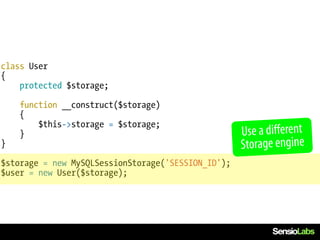
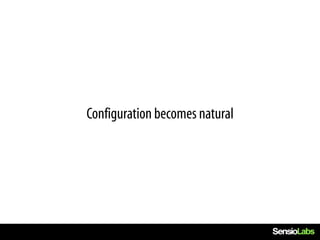
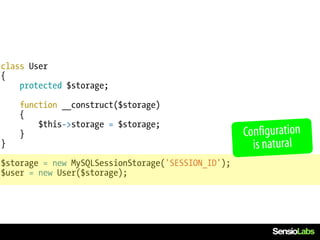
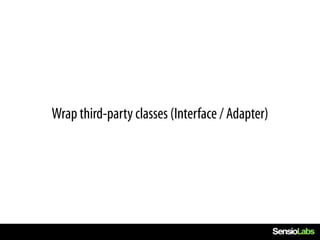
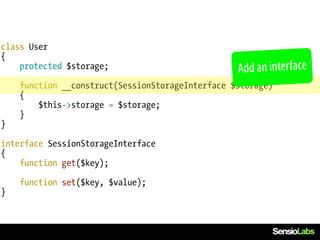
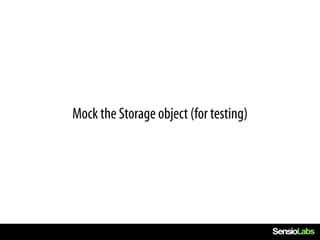
![class User
{
protected $storage;
function __construct(SessionStorageInterface $storage)
{
$this->storage = $storage;
}
}
Mock the Session
class SessionStorageForTests implements SessionStorageInterface
{
protected $data = array();
static function set($key, $value)
{
self::$data[$key] = $value;
}
}](https://image.slidesharecdn.com/dependency-injection-111028101440-phpapp01/85/Dependency-injection-in-PHP-5-3-5-4-29-320.jpg)
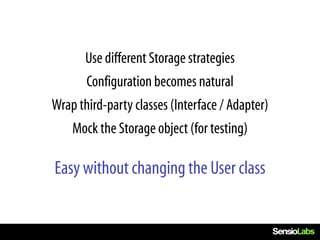
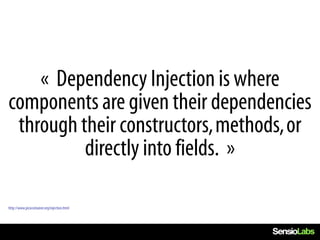
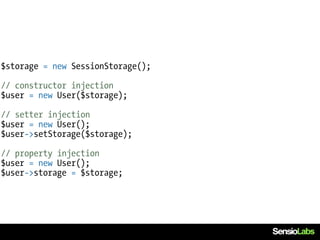
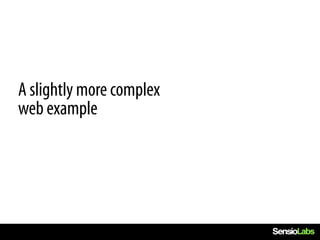
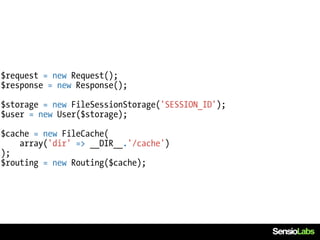
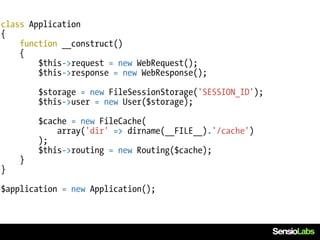

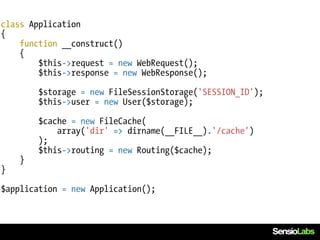
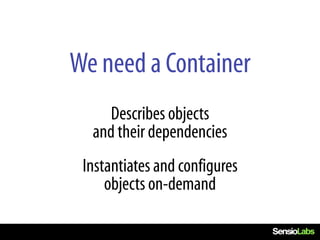
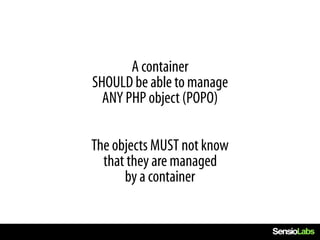
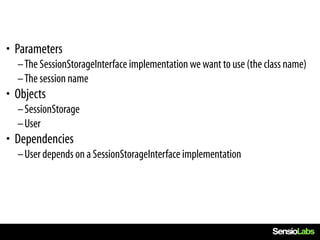
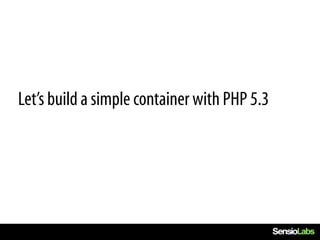
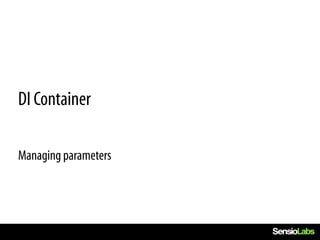
![class Container
{
protected $parameters = array();
public function setParameter($key, $value)
{
$this->parameters[$key] = $value;
}
public function getParameter($key)
{
return $this->parameters[$key];
}
}](https://image.slidesharecdn.com/dependency-injection-111028101440-phpapp01/85/Dependency-injection-in-PHP-5-3-5-4-43-320.jpg)
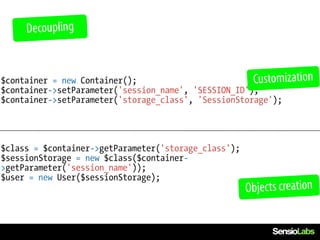
![Using PHP
magic methods
class Container
{
protected $parameters = array();
public function __set($key, $value)
{
$this->parameters[$key] = $value;
}
public function __get($key)
{
return $this->parameters[$key];
}
}](https://image.slidesharecdn.com/dependency-injection-111028101440-phpapp01/85/Dependency-injection-in-PHP-5-3-5-4-45-320.jpg)
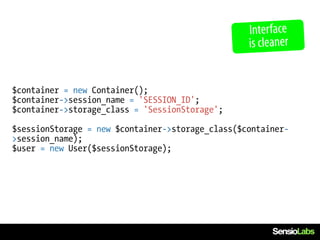
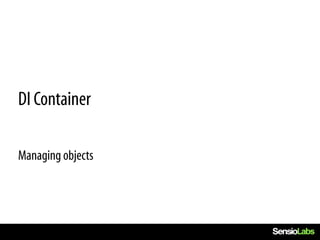
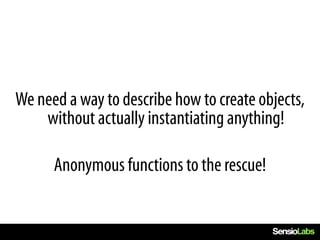
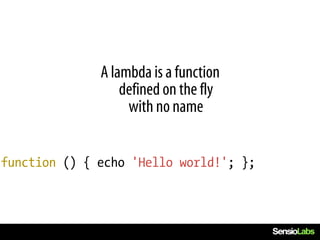
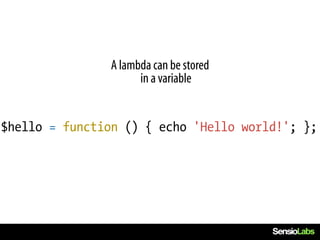
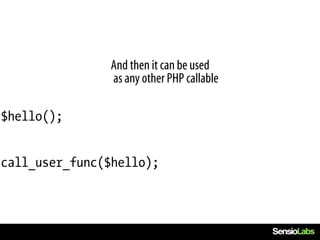
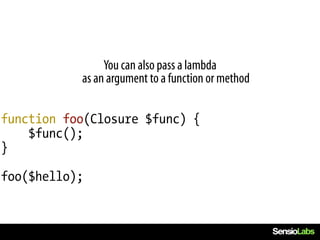
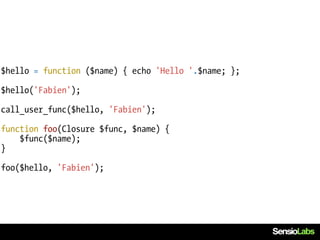
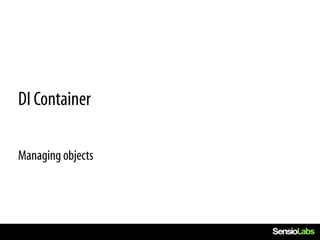
![class Container
{
protected $parameters = array();
protected $objects = array();
public function __set($key, $value)
{
$this->parameters[$key] = $value;
}
public function __get($key) Store a lambda
{
return $this->parameters[$key]; able to create the
} object on-demand
public function setService($key, Closure $service)
{
$this->objects[$key] = $service; the closure to create
Ask
} t and pass the
the objec
public function getService($key) current Container
{
return $this->objects[$key]($this);
}
}](https://image.slidesharecdn.com/dependency-injection-111028101440-phpapp01/85/Dependency-injection-in-PHP-5-3-5-4-55-320.jpg)
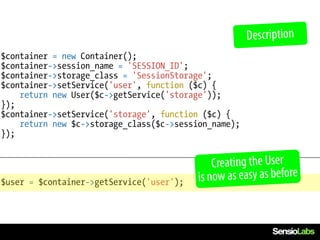
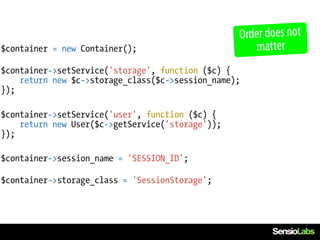
![class Container Simplify the code
{
protected $values = array();
function __set($id, $value)
{
$this->values[$id] = $value;
}
function __get($id)
{
if (is_callable($this->values[$id])) {
return $this->values[$id]($this);
} else {
return $this->values[$id];
}
}
}](https://image.slidesharecdn.com/dependency-injection-111028101440-phpapp01/85/Dependency-injection-in-PHP-5-3-5-4-58-320.jpg)
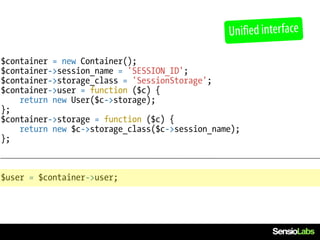
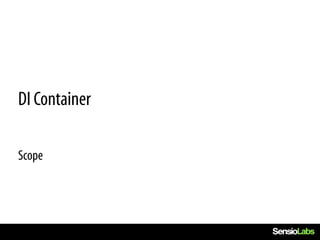
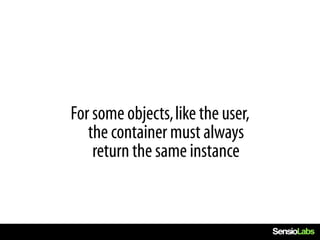
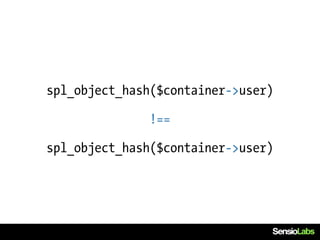
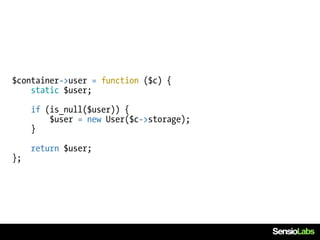
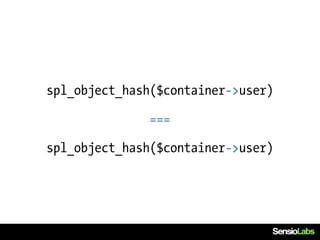
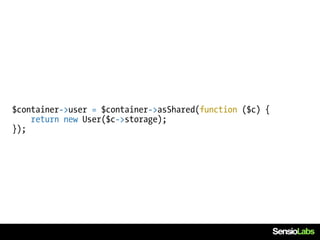
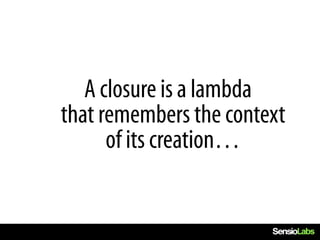
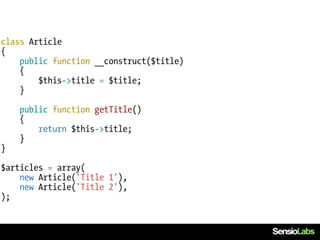
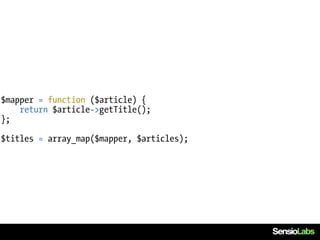
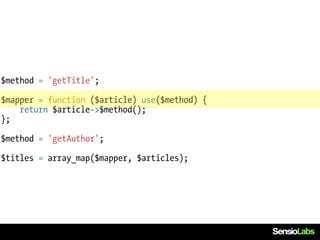
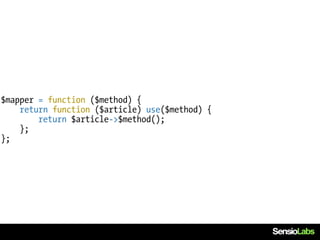
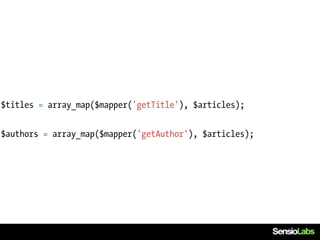
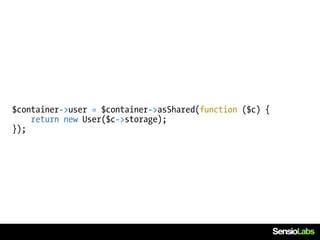
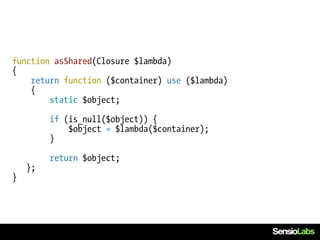
![class Container
{
protected $values = array();
function __set($id, $value)
{
$this->values[$id] = $value;
}
function __get($id) Error management
{
if (!isset($this->values[$id])) {
throw new InvalidArgumentException(sprintf('Value
"%s" is not defined.', $id));
}
if (is_callable($this->values[$id])) {
return $this->values[$id]($this);
} else {
return $this->values[$id];
}
}
}](https://image.slidesharecdn.com/dependency-injection-111028101440-phpapp01/85/Dependency-injection-in-PHP-5-3-5-4-74-320.jpg)
![class Container
{
protected $values = array();
function __set($id, $value)
{
$this->values[$id] = $value;
}
function __get($id)
{
if (!isset($this->values[$id])) {
throw new InvalidArgumentException(sprintf('Value "%s" is not defined.', $id));
}
if (is_callable($this->values[$id])) {
return $this->values[$id]($this);
} else {
return $this->values[$id];
}
}
function asShared($callable)
{
return function ($c) use ($callable) {
static $object;
if (is_null($object)) { 40 LO C for a fully-
}
$object = $callable($c);
feature d container
return $object;
};
}
}](https://image.slidesharecdn.com/dependency-injection-111028101440-phpapp01/85/Dependency-injection-in-PHP-5-3-5-4-75-320.jpg)
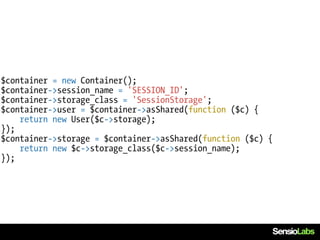


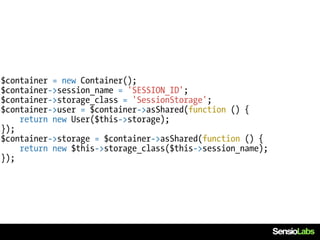
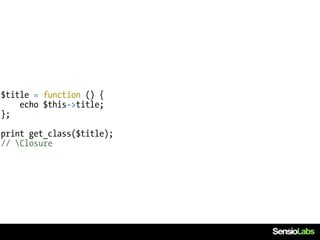
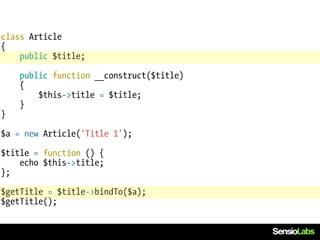
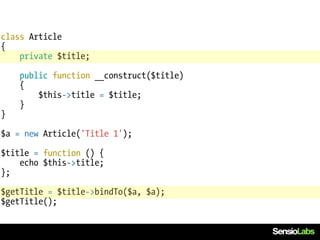
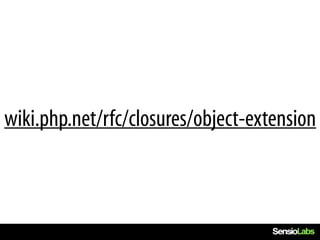
![if (is_callable($this->values[$id])) {
$value = $value->bindTo($this);
return $this->values[$id]();
} else {
return $this->values[$id];
}](https://image.slidesharecdn.com/dependency-injection-111028101440-phpapp01/85/Dependency-injection-in-PHP-5-3-5-4-84-320.jpg)
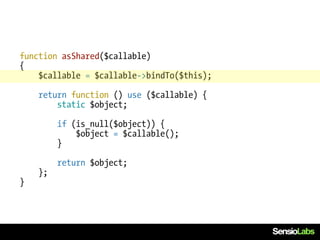
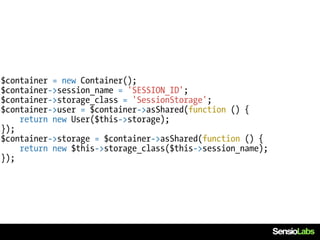
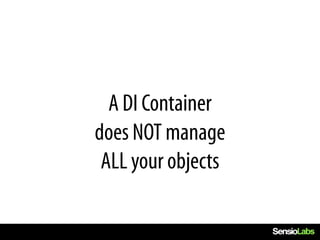
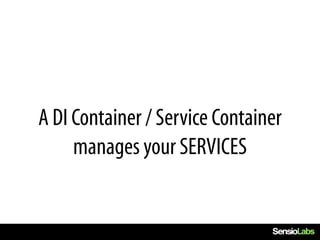
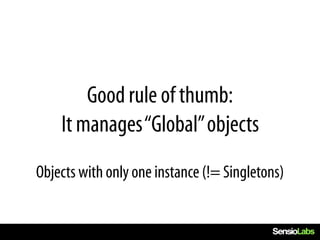
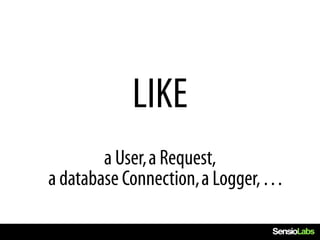
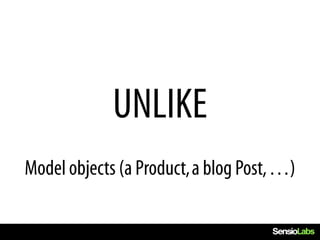
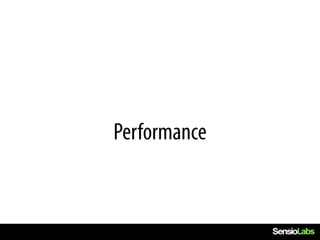
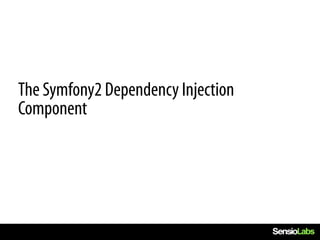
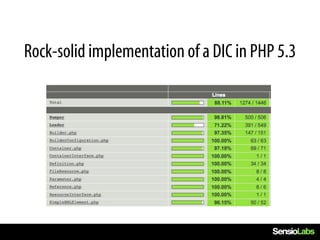
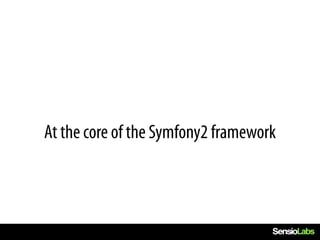
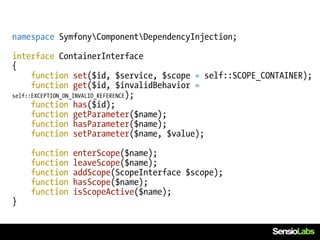
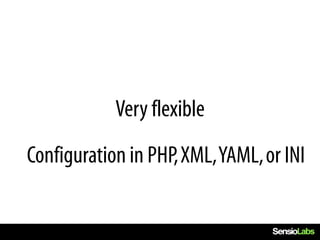
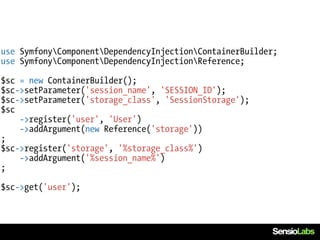
![parameters:
session_name: SESSION_ID
storage_class: SessionStorage
services:
user:
class: User
arguments: [@storage]
storage:
class: %storage_class%
arguments: [%session_name%]](https://image.slidesharecdn.com/dependency-injection-111028101440-phpapp01/85/Dependency-injection-in-PHP-5-3-5-4-99-320.jpg)
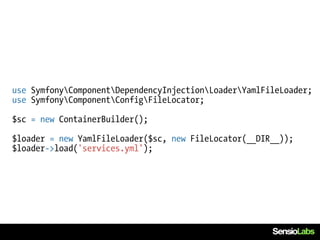
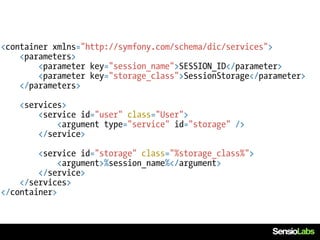
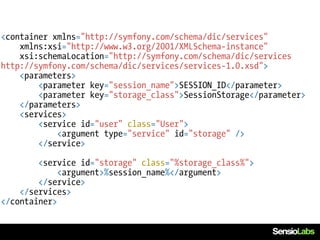
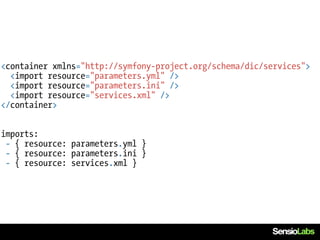
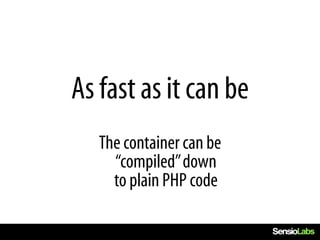
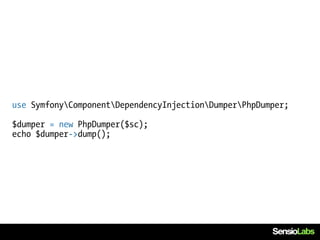
![class ProjectServiceContainer extends Container
{
public function __construct()
{
parent::__construct(new ParameterBag($this->getDefaultParameters()));
}
protected function getStorageService()
{
$class = $this->getParameter('storage_class');
return $this->services['storage'] = new $class($this-
>getParameter('session_name'));
}
protected function getUserService()
{
return $this->services['user'] = new User($this->get('storage'));
}
protected function getDefaultParameters()
{
return array(
'session_name' => 'SESSION_ID',
'storage_class' => 'SessionStorage',
);
}
}](https://image.slidesharecdn.com/dependency-injection-111028101440-phpapp01/85/Dependency-injection-in-PHP-5-3-5-4-106-320.jpg)
